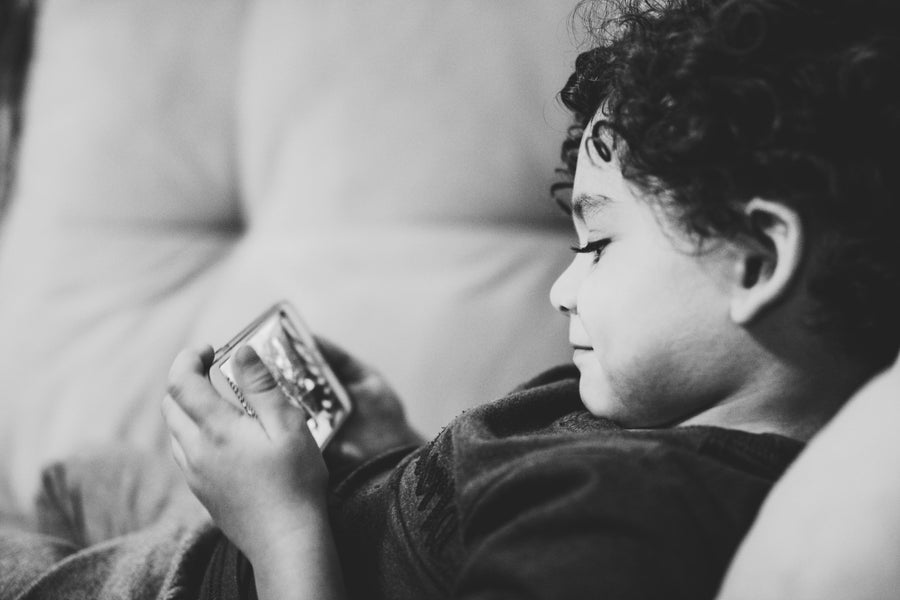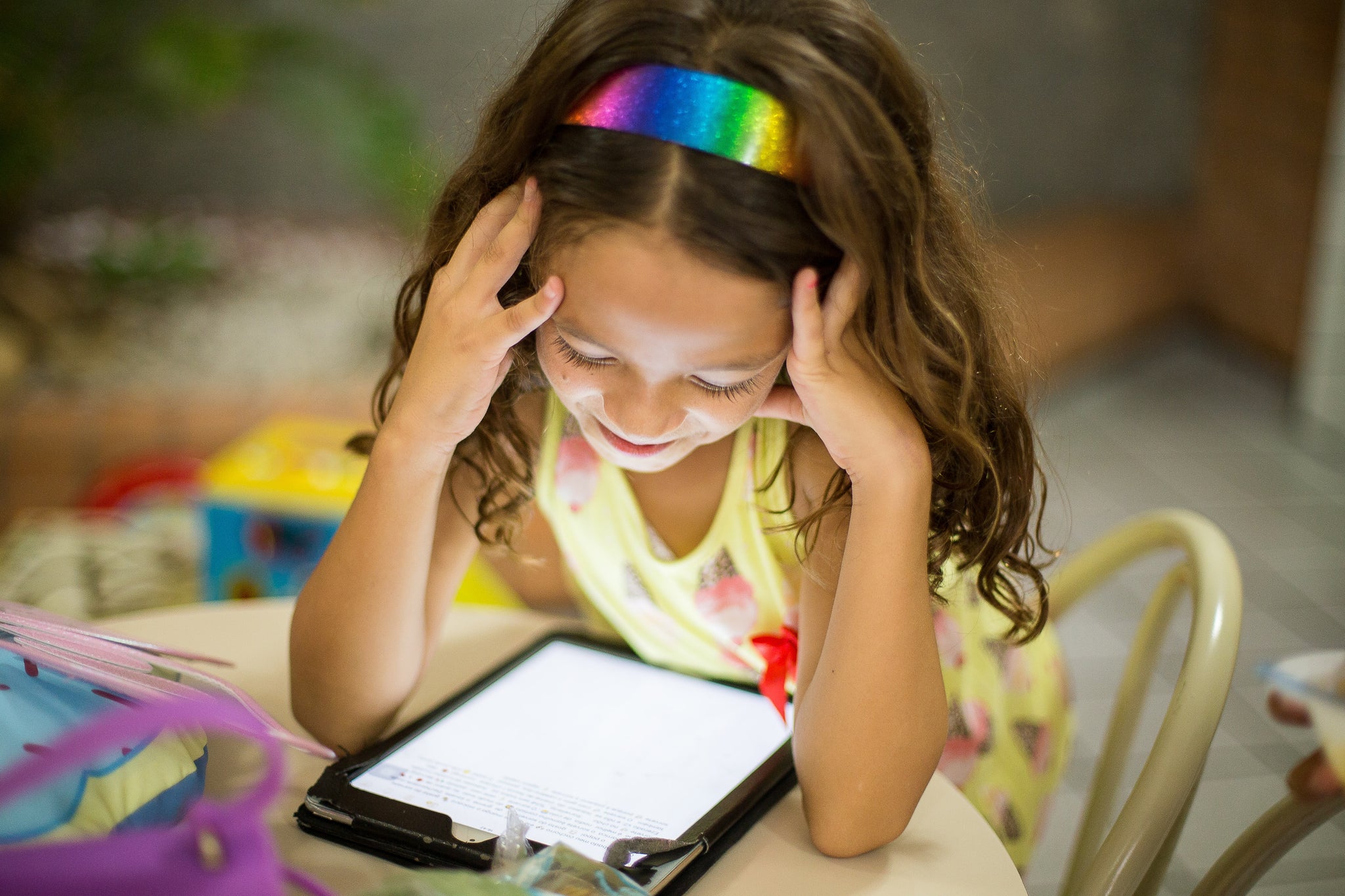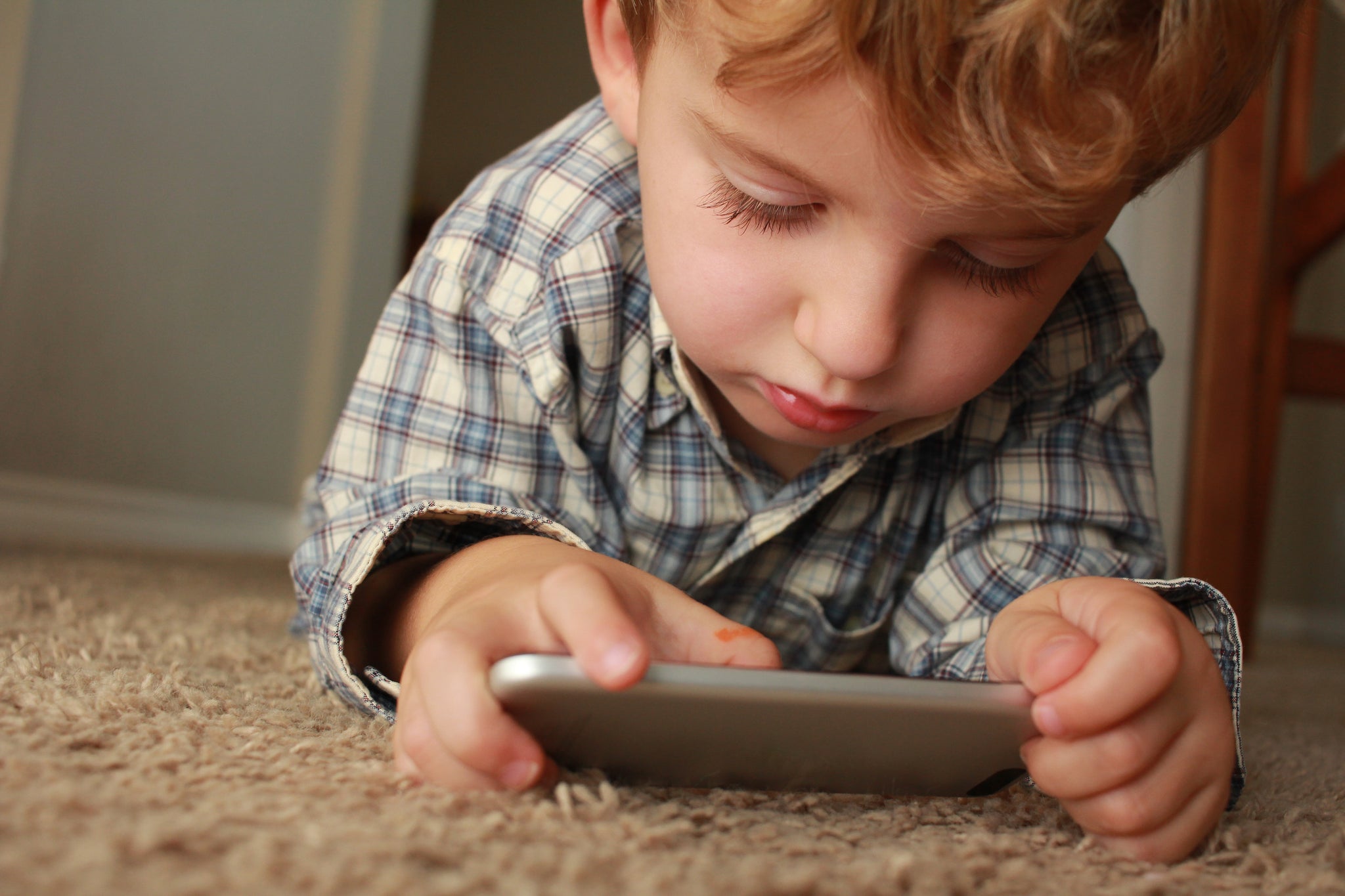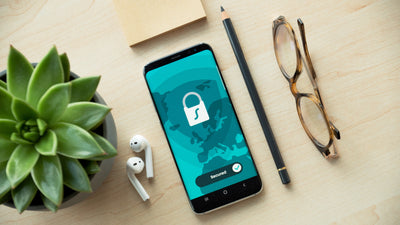Screen Time for Children: Time Well Spent or a Drain on Brain Capacity & Sleep?

Screen time. It’s the catch-all buzz-term for the amount of time that children spend glued to smartphones, computers, TVs, digital tablets and video games – and it’s on the rise.
53% of children in the UK now own ,(1) a mobile phone by the age of seven, spending - on average – three hours and 20 minutes every day staring at its screen. The majority of British children say they keep their phone on them at all times, never turn it off and sleep with it beside their bed. By age 11, child mobile phone ownership explodes; becoming almost universal.
Whether it’s watching ‘funny’ videos on YouTube (used by 61% (2) of children every day), doing homework, chatting to friends on WhatsApp, playing interactive games like Minecraft, watching cartoons on Netflix or posting pictures to Snapchat, children now spend more time in front of screens than ever before.
For exhausted parents, it can be tempting to use technology as the digital equivalent of a dummy: a kind of pacifier, to get you through a long journey or to make it to the end of a restaurant meal without any meltdowns.
Digital devices also have some undeniable benefits, and given that technology is such a fundamental part of modern life, it’s vital that children are equipped with the knowledge of how to use it properly.
But a more sinister side to society’s obsession with screens is starting to emerge.
Ex Google employee Justin Rosenstein told the Guardian (3) “It is very common for humans to develop things with the best of intentions and for them to have unintended, negative consequences.”
“One reason I think it is particularly important for us to talk about this now”, said Rosenstein, is that “we may be the last generation that can remember life” before screens.
When a journalist suggested to Apple Impresario Steve Jobs that his children must have loved the just-released iPad, (4) he shut the question down. “They haven’t used it”, Jobs replied. “We limit how much technology our kids use at home.”
In a revealing turn of events, many Silicon Valley technologists are even reported to be sending their children to schools where iPads, iPhones and laptops are banned.
What, if anything, could be behind the very people who developed our digital devices, choosing to drastically limit – or even eliminate entirely - their own children’s access to screens?
In our search for answers, we’re delving into the scientific research to explore the potential health implications of too much time spent screen-watching.

Transfixed: the addiction-forming, attention-stealing nature of screens in children’s lives
Pierre Laurent, a tech executive working in Silicon Valley, explains (5) that, embedded within all screen-based technology, “there’s an intent to keep them (children) engaged”.
Designers “don’t want you to wander and start playing with another product”, says Laurent, “so it has a hooking effect, and there’s a risk to attention”.
Likening attention to “a muscle that we build”, Laurent says “it’s about being able to tune out all the distraction and focus on one thing”. “When you engage with these devices”, he explains, “you don’t build that capacity. It’s computer-aided attention; you’re not learning to do it.”
Deciding whether children’s captivation with screens is a cause or a consequence of attention problems is something that researchers are still wrestling with. (6)
Some studies have found that children who spend more time in front of a screen are more likely to develop attention difficulties.
In a 2010 study (7) which appeared in the journal Pediatrics, children who played video games for more than two hours a day were shown to be 67% more likely than their peers to have issues with maintaining focus.
Just last year, another study (8) concluded that screen time - including watching TV, using a computer, tablet, mobile phone, or, again, playing video games - was associated with inattention problems in children as young as pre-school age.
According to (9) Dr. Christopher Lucas, Associate Professor of Child Psychiatry at New York University School of Medicine, it’s the type of attention demanded by these kinds of technology which is key here, and that type, Lucas says, is “sustained attention with frequent intermittent rewards”.
Through its manipulative use of frequent intermittent rewards, could digital technology be encouraging not only attention problems, but also addiction-forming behaviours, in children? Could it be capable of tapping into the same brain chemistry pathways as addiction to, say, drugs, or gambling?
Nicholas Kardaras PH.D, author of Glow Kids, certainly thinks so. “While we've declared a so-called War on Drugs, we’ve allowed this virtual drug - which Dr Peter Whybrow, director of neuroscience at UCLA, calls ''electronic cocaine'' - to slip into homes and classrooms of our youngest and most vulnerable, seemingly oblivious to any negative effects.”
Tristan Harris, a former Google ‘design ethicist’ (responsible for studying how you ethically steer people’s thoughts using tech), explains that (10) the most seductive technology exploits the same psychological susceptibility that makes gambling so addictive. Take the pull-to-refresh screen swiping mechanism now so ubiquitous across newsfeeds and social media, for example. “Each time you’re swiping down, it’s like a slot machine,” Harris says. “You don’t know what’s coming next. Sometimes it’s a beautiful photo. Sometimes it’s just an ad.” This visually appealing aspect of digital screens is what, worryingly, may make them even harder for children to resist.
Kardaras points out that China has identified Internet Addiction Disorder (IAD) as “its number-one health crisis, with more than 20 million Internet-addicted teens, and South Korea has opened 400 tech addiction rehab facilities.”
Indeed, according to (11) 2017 research carried out by the neuroradiology team at Korea University in Seoul, the brain chemistry of internet-addicted children is markedly different from that of ‘non-addicted’ children. Specifically, changes were noted in the ratio of the neurotransmitter GABA to other neurotransmitters within what is known as the ‘reward circuit’ of the brain.
Further research, (12) this time focusing on the power of Instagram’s ‘like’ function, reported that when participants viewed Instagram photos with more likes, the cells in one of the key reward areas of the brain were activated.
“There is a hidden goal driving the direction of the technology we make, and that goal is the race for our attention” Harris revealed in his 2017 TED talk. (13) “All of our minds can be hijacked. Our choices are not as free as we think they are.”
Harris also cites Snapchat - “the no.1 way that teenagers in the United States communicate” - and its addictive ‘Snapstreaks’ feature, which rewards the number of consecutive days that two people have communicated with each other. “It’s been shown that when teenagers go on vacation, they give their passwords to up to five other friends just to keep their Snapstreaks going”, Harris says.
Considering the urgency of the situation surrounding screen time and its attention-sapping, addiction-forming abilities, Harris admits he doesn’t know “a more urgent problem than this”.
“Not only is it taking away our agency to spend our attention the way we want, but it’s changing our democracy, and it’s changing our ability to have the conversations and relationships that we want with each other.”

Wide awake: how screens can disrupt children’s sleep and even trigger sleep disorders
Hospital admissions for children with sleep disorders in England have risen sharply, new data from NHS Digital has revealed. (14) Admissions for conditions such as insomnia have almost doubled in just seven years.
Experts are attributing this growing public health emergency to factors including obesity, mental health issues and – significantly – the dramatic increase in the use of, and reliance on, digital screens and personal technology by children.
Rachael Taylor, founder of infant and children’s sleep consultancy The Sleep Sanctuary, (15) told the Guardian:
“The blue light emitted from phone, tablet, computer and TV screens disrupts natural melatonin production, which inhibits sleep. I’m increasingly seeing more and more young children sent to bed with a screen to help them fall asleep, when it is in fact disrupting their sleep and making falling asleep more difficult.”
Hidden away inside the retina of every human eye lie millions of photoreceptors.(16) Incredibly sensitive to light and dark, these photoreceptors are directly connected to the part of the brain responsible for regulating the body’s internal timing mechanism, known as the ‘body clock’. Naturally set to a 24-hour timetable, this in-built biological scheduling system is now being constantly wrong-footed (17) through our modern-day over-exposure to artificial light.
This is because the blue light emitted by our digital devices is wrongly interpreted by our body clock as daylight. When we use our mobile phones, tablets, e-readers or laptops at bedtime, we’re essentially telling our brain that it’s not time to go to sleep yet. And when this happens, rather than receiving the usual release of the sleep-inducing hormone melatonin (which is actively suppressed by light), we feel abnormally awake and energised. Whilst light of any kind can stifle melatonin release, blue light at night (18) does so more significantly.
Vicki Dawson, the founder of the Children’s Sleep Charity, (19) echoed the idea of screen activity being detrimental to sleep, telling the Guardian that there was “a real lack of understanding around the impact that screens can have on sleep”, and revealing her organisation had been swamped with requests from parents desperate for help.
Worryingly, earlier this year, a Childwise survey found (20) that more than half (57%) of children now sleep with their mobile phone beside their bed, showing the pivotal place of mobile technology in young people’s waking – and sleeping – lives.

Brain drain: how too much screen time can impact on children’s intelligence
Doctors and scientists are increasingly concerned about the impact of screen time on the development of children’s brains. Experts worry that excessive screen-watching could hamper children’s ability to learn basic skills such as speaking, reading and writing – with too much time in front of a screen potentially even capable of lowering a child’s IQ.
A recent study (21) focusing on children aged 2-5 (when brain development is progressing most rapidly), linked more screen time with lower scores in “milestone” tests of problem-solving, communication, social skills and coordination.
The study suggested that exposure to screens at an early age can have long-lasting effects, with consequences evident up to two years later.
“Excessive screen time can impinge on children’s ability to develop optimally”, the study’s authors wrote. “When young children are observing screens, they may be missing important opportunities to practice and master interpersonal, motor, and communication skills.”
By the time they start school, the report suggested that “1 in 4 children” show some degree of delayed or deficient development in “language, communication, motor skills and/or socioemotional health”, leaving them “inadequately prepared for learning and academic success”.
Screen time negatively impacting on children’s literacy is a recurring theme in recent research.
Released in November 2019, a study (22) in JAMA Pediatrics, showed that children who spend more time looking at screen have lower structural integrity of white matter tracts in the parts of the brain that support literacy skills. These same children also achieved below average scores in language and literacy tests.
Published in the Journal of Developmental and Behavioural Paediatrics, a separate 2019 study (23) demonstrated a significant association between mobile device use and parent-reported expressive speech delay in the 18-month-old children it analysed.
Interestingly, additional research (24) showed that students who read text in print scored significantly better on reading comprehension test than students who read the same texts digitally.
Other scientists see smartphones specifically as the worst offenders, referring to the reduction in cognitive capacity, or ‘brain drain’, they can induce in young people.
Evidence (25) shows that the mere presence of a smartphone – even if it is turned off - can “adversely affect available working memory capacity and functional fluid intelligence”.
The authors of the 2017 report on the subject write that, as many smartphone owners are in school, the presence of their mobile devices in educational institutions “may undermine both learning and test performance”.

‘They sit and stare and stare and sit until they’re hypnotised by it’
On a lighter note, we’ve been enjoying revisiting the wise words of Children’s literary idol, Roald Dahl, and his hilarious (yet spookily accurate) cautionary tale of Mike Teavee, the screen-obsessed character from the much-loved book, Charlie and the Chocolate Factory. Here’s a little taster for you too:
In almost every house we've been,
We've watched them gaping at the screen.
They loll and slop and lounge about,
And stare until their eyes pop out.
(Last week in someone's place we saw
A dozen eyeballs on the floor.)
They sit and stare and stare and sit
Until they're hypnotised by it,
Until they're absolutely drunk
With all that shocking ghastly junk.
Oh yes, we know it keeps them still,
They don't climb out the window sill,
They never fight or kick or punch,
They leave you free to cook the lunch
And wash the dishes in the sink —
But did you ever stop to think,
To wonder just exactly what
This does to your beloved tot?
IT ROTS THE SENSE IN THE HEAD!
IT KILLS IMAGINATION DEAD!
IT CLOGS AND CLUTTERS UP THE MIND!
IT MAKES A CHILD SO DULL AND BLIND
HE CAN NO LONGER UNDERSTAND
A FANTASY, A FAIRYLAND!
HIS BRAIN BECOMES AS SOFT AS CHEESE!
HIS POWERS OF THINKING RUST AND FREEZE!
HE CANNOT THINK — HE ONLY SEES!
Extract taken from Roald Dahl, Charlie and the Chocolate Factory
Up Next…
Now that we’ve explored the potential problems around too much screen time, next up, we’re going to be looking at ways you can try to reduce it – plus positive, practical alternatives and activities to keep your children healthy, happy and entertained.
References
(1) https://www.bbc.co.uk/news/education-51296197
(2) https://www.bbc.co.uk/news/education-51296197
(3) https://www.theguardian.com/technology/2017/oct/05/smartphone-addiction-silicon-valley-dystopia
(4) https://www.nytimes.com/2014/09/11/fashion/steve-jobs-apple-was-a-low-tech-parent.html
(5) https://www.theguardian.com/technology/2015/may/23/screen-time-v-play-time-what-tech-leaders-wont-let-their-own-kids-do
(6) https://www.nytimes.com/2011/05/10/health/views/10klass.html
(7) https://www.health.com/condition/adhd/video-games-attention-span
(8) https://journals.plos.org/plosone/article?id=10.1371/journal.pone.0213995#pone.0213995.ref005
(9) https://www.nytimes.com/2011/05/10/health/views/10klass.html
(10) https://www.theguardian.com/technology/2017/oct/05/smartphone-addiction-silicon-valley-dystopia
(11) https://www.eurekalert.org/pub_releases/2017-11/rson-sac111717.php
(12) https://journals.sagepub.com/doi/abs/10.1177/0956797616645673
(13) https://www.ted.com/talks/tristan_harris_how_a_handful_of_tech_companies_control_billions_of_minds_every_day
(14) https://www.theguardian.com/society/2020/mar/06/sharp-rise-in-hospital-admissions-for-children-with-sleep-disorders-in-england
(15) http://www.mysleepsanctuary.co.uk/
(16) https://www.ncbi.nlm.nih.gov/pubmed/19777353
(17) https://www.newyorker.com/science/maria-konnikova/why-cant-we-fall-asleep
(18) https://www.health.harvard.edu/staying-healthy/blue-light-has-a-dark-side
(19) https://www.thechildrenssleepcharity.org.uk/
(20) https://www.bbc.co.uk/news/education-51296197
(21) https://jamanetwork.com/journals/jamapediatrics/fullarticle/2722666
(22) https://jamanetwork.com/journals/jamapediatrics/article-abstract/2754101
(23) https://www.ncbi.nlm.nih.gov/pmc/articles/PMC6382042/
(24) https://www.sciencedirect.com/science/article/pii/S0883035512001127
(25) https://www.journals.uchicago.edu/doi/10.1086/691462





































